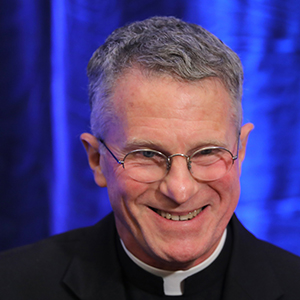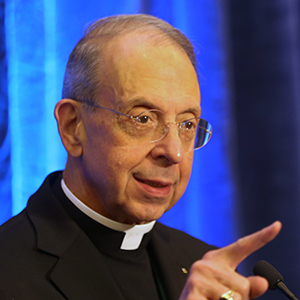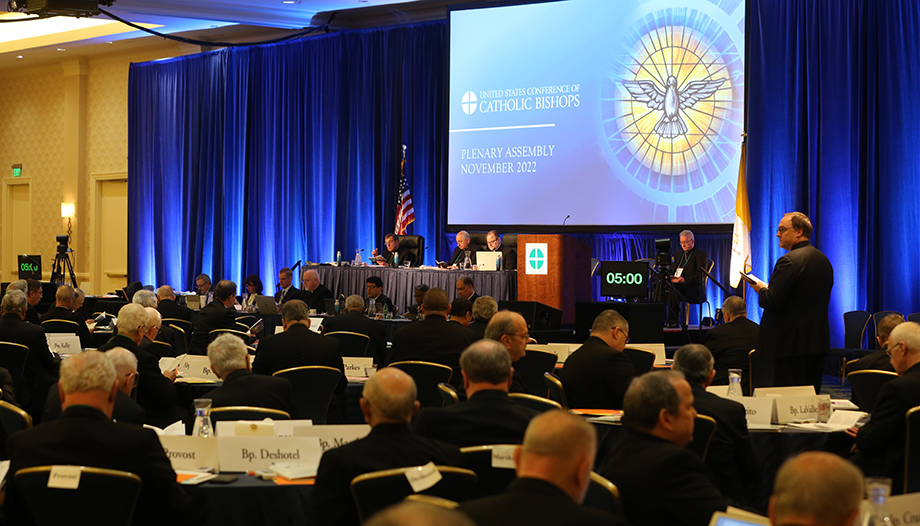This meeting is of particular importance because the new leadership of the Conference, together with the bishops of the country, will have to design the pastoral priorities and the strategic plan of the Conference for the coming years. These plans should be based on a synodal and missionary Church.
One of the first activities of the session was the election of the new leadership of the USCCB for the triennium 2022-2025. By majority vote, the North American bishops elected Archbishop Timothy P. Broglio, Archbishop of the Archdiocese of the Military Services, and Archbishop William E. Lori, Archbishop of Baltimore, as President and Vice President, respectively. They replace Msgr. José H. GomezAllen H. Vigneron, Archbishop of Los Angeles, and Archbishop Allen H. Vigneron, Archbishop of Detroit, who will complete their terms of office.
The work of this Assembly began with an address by the Apostolic Nuncio, followed by a speech by Bishop José H. Gómez.
Living synodality in the Church
In his intervention, the Nuncio asked "Where are we as a Church and where are we going?". "The Church has to go out to evangelize or it runs the risk of becoming sick and becoming self-referential. It must be a poor Church for the poor" the Nuncio continued. "The synodal process," he continued, "involves discernment, purification and reform. A missionary Church impels all the baptized to be evangelizing disciples".
"This is why," Pierre indicated, "the laity must be seen not only as 'collaborators of the clergy' but be recognized as true co-responsible for the mission and action of the Church." "It is a matter of having mature and committed disciples," he specified. "How can this be done? By means of holiness: the exhortation. Gaudete et Exsultate is a beautiful mediation on the call to holiness of all the faithful".
"The Church in the United States," the Nuncio noted, "is beginning to think and live in a synodal way. But there are still afflictions that require understanding, listening and patience. It seems to me that a good deal of the division in the country, in neighborhoods, in families and even in the Church, comes from the fact that we have forgotten to be with one another and to talk to one another."
The Nuncio looks to the future of the North American Church with hope: "Sometimes we can get caught up in crisis thinking and elaborate a crisis dialogue, but if one looks at history, in the providential designs of God, the Church emerges and emerges from crisis experiences. These moments allow us to discern the presence of the Lord and to refocus on the mission and on the path towards which we are heading together," concluded Bishop Pierre.
"We need a new generation of saints"
The theme of crises was also present in the final speech of Bishop José H. Gómez. Probably, as he affirms, it fell to him to head the USCCB in times without precedent in history due to the number of situations that occurred simultaneously in the USA and the world: "We went through a pandemic, riots in our citiesa presidential election; deep political, economic, and cultural divisions; the annulment of Roe v. Wade; a new war in Europe; a global refugee crisis."
"In general," Gomez noted, "our society has rapidly moved toward an uncompromising secularism where traditional norms and values are severely challenged."
However, for Gomez, even in the midst of these situations, the hope that is Christ shines even brighter. The key is holiness: "Today we need a new generation of saints, men and women. I am hopeful for the next Synod of Bishops. For the Synod is about our vocation to love Jesus and build his Kingdom in the ordinary circumstances of our daily lives."
Paraphrasing the Servant of God and founding activist of the Catholic Worker Movement, Dorothy Day, Gomez said, "In our world there is room for great saints as never before. We are all called to be saints. Now more than ever, the Church needs solid pastoral strategies to communicate the Gospel, to use the media platform and networks to turn our hearts and minds to Christ, to call our people to become great saints.
In the call and in the exercise of holiness, Gomez indicated that the current times in the U.S. also offer us a providential opportunity, which is the Eucharistic Revival Initiative (link): "What keeps us united and makes us one is the Eucharist. That is why the Eucharistic Renaissance is so important. The Eucharist is the mystery of our Creator's love, the mystery of his desire to share his divine life in friendship with each one of us," he concluded.
Msgr. Timothy P. Broglio
Archbishop Broglio was born in 1951 in Cleveland Heights, Ohio. He studied at Boston College and later earned a Doctorate in Canon Law from the Gregorian University in Rome.

He was ordained to the priesthood on May 19, 1977. In 1979 he entered the Pontifical Ecclesiastical Academy. He worked in the Nunciatures in Ivory Coast and Paraguay.
From 1990 to 2001 he served as chief of staff to Cardinal Angelo Sodano. In February 2001 he was appointed Apostolic Nuncio to the Dominican Republic and Apostolic Delegate to Puerto Rico.
He was ordained a bishop by St. John Paul II on March 19, 2001. On November 19, 2007, he was named the fourth archbishop of the U.S. Military Services.
The headquarters of this military archdiocese is located in Washington D.C., just steps away from the USCCB headquarters.
Msgr. William E. Lori
William E. Lori was born in Louisville, Kentucky (KY). He attended St. Pius X Seminary in Erlanger, KY in 1973. He earned a master's degree from Mount St. Mary's Seminary in Emmitsburg, Maryland in 1977 and then a doctorate in theology from The Catholic University of America in Washington, D.C., 1982.

He was ordained to the priesthood in 1977 at St. Matthew's Cathedral in Washington, DC. In his ministry he also served as secretary to Cardinal James Hickey as well as chancellor, moderator of the curia and vicar general.
In 1995 he was ordained auxiliary bishop of Washington, DC and, in 2001, he was appointed bishop of the Diocese of Bridgeport, Connecticut.
Archbishop Lori was instrumental in the drafting of the historic Charter for the Protection of Children and Young People.
In 2005, he was elected Supreme Chaplain of the Knights of Columbus. On March 20, 2012, Pope Benedict XVI appointed him the 16th Archbishop of Baltimore.







